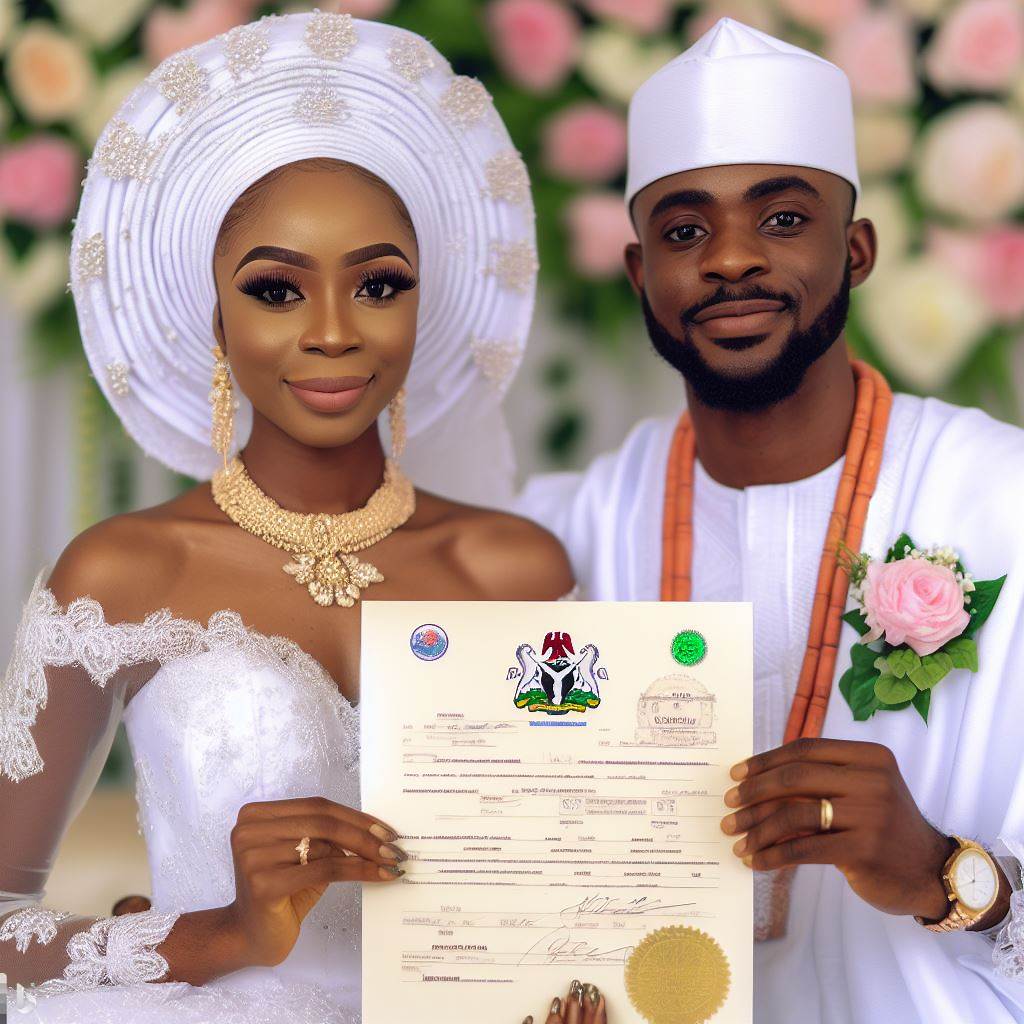Introduction
Marriage registration is a crucial legal process in Nigeria, ensuring the recognition and protection of matrimonial unions.
Importance of Marriage Registration
- Legal Recognition: Marriage registration in Nigeria provides legal recognition to the union, granting the couple rights and responsibilities.
- Evidence of Marriage: It serves as evidence of the marriage, which is often required for various official purposes.
- Asset Sharing: Registration facilitates the fair distribution of assets and liabilities in case of divorce.
- Custody and Inheritance: It plays a pivotal role in child custody and inheritance matters.
- Security: Registration offers security to both partners, assuring them of their rights within the marriage.
Introducing Nigeria Marriage Registry
- Purpose: This blog post introduces the Nigeria Marriage Registry and offers valuable tips to expedite the registration process.
- Simplifying the Process: We will guide you on the necessary steps, documents, and best practices.
- Smooth Registration: Your marriage registration journey in Nigeria can be efficient, hassle-free, and legally sound.
Overview of Nigeria Marriage Registration Process
Getting married is an important milestone in one’s life, and in Nigeria, it is necessary to register the marriage with the appropriate authorities.
The Nigeria Marriage Registry is responsible for overseeing this process and ensuring that all legal requirements are fulfilled.
Legal Requirements and Procedures involved in Registering a Marriage in Nigeria
- Age Requirement: Both parties must be at least 21 years old or have the consent of their parents/guardians if under 21.
- Identification: Each party must provide valid identification such as a passport or driver’s license.
- Residence: At least one of the parties must have been a resident in the district where the marriage is to be registered for at least 15 days preceding the registration.
- Declaration of Marriage: The couple must declare their intention to marry in the presence of the Registrar.
- Notice of Marriage: A notice must be displayed at the registry for at least 21 days to allow for objections or legal challenges.
- Witnesses: Two witnesses over the age of 18 (who are not blood relatives) must be present during the registration process.
- Affidavit: The couple must swear an affidavit affirming that they are not married to anyone else.
- Marriage Certificate: Once all requirements are fulfilled, a marriage certificate will be issued to the couple.
Significance of Obtaining a Marriage Certificate from the Registry
Obtaining a marriage certificate from the Nigeria Marriage Registry is not only a legal requirement but also holds great significance for various reasons.
- Legal Protection: Having a valid marriage certificate provides legal protection and recognition of the marriage.
- Proof of Marriage: The certificate serves as proof of marriage, which is often required for various official purposes such as obtaining a passport or visa.
- Inheritance Rights: The certificate ensures that both parties have legal inheritance rights and can claim benefits or assets in case of the other party’s demise.
- Divorce Proceedings: In case of divorce, a marriage certificate is a crucial document required for legal proceedings.
- Social Recognition: Obtaining a marriage certificate helps establish the legitimacy of the marriage in society and among family members.
In fact, registering a marriage in Nigeria involves fulfilling specific legal requirements and procedures set by the Nigeria Marriage Registry.
These include age restrictions, providing identification, residence consent, declaration of marriage, notice period, witnesses, affidavits, and ultimately obtaining a marriage certificate.
The significance of obtaining this certificate cannot be overstated, as it ensures legal protection, proof of marriage, inheritance rights, and social recognition.
It is essential to adhere to the registration process and obtain the necessary documentation to secure the rights and privileges associated with a legally recognized marriage in Nigeria.
Read: The Influence of Religion on Marriage: Must-Read Books
Understanding the Required Documents
Getting married is an exciting milestone in one’s life, and in Nigeria, it is important to go through the marriage registry to make it legal.
To expedite your registration process, it is vital to understand the required documents and their purposes.
Checklist of Documents Needed for Marriage Registration in Nigeria:
- Birth certificates of bride and groom.
- Valid identification cards (such as National ID card, International Passport, or Driver’s License).
- Passport-sized photographs of the couple.
- Letter of consent for minors (if either bride or groom is under 21 years old).
- Sworn affidavit of bachelorhood/spinsterhood.
- Sworn affidavit of freedom to marry from each partner.
- Parents’ consent letter (if either bride or groom is under 18 years old).
- Death certificate or divorce decree (if either partner is widowed or divorced).
Elaboration on Each Document and Its Purpose
- Birth certificates of bride and groom: These documents prove the date and place of birth of the individuals involved.
- Valid identification cards: These cards provide proof of identity and citizenship.
- Passport-sized photographs of the couple: These photographs are required for official documentation purposes and identification.
- Letter of consent for minors: This document is necessary if either the bride or groom is under 21 years old and requires parental consent for the marriage.
- Sworn affidavit of bachelorhood/spinsterhood: This affidavit serves as a declaration that the individuals have never been previously married.
- Sworn affidavit of freedom to marry from each partner: This affidavit confirms that both parties are legally eligible to marry and are not bound by any other marriage.
- Parents’ consent letter: If either the bride or groom is under 18 years old, a letter of consent from their parents is required.
- Death certificate or divorce decree: If either partner is widowed or divorced, these documents are necessary to provide proof of previous marriage termination.
Specific Requirements or Challenges During Document Submission
While gathering the required documents and submitting them at the marriage registry, there are a few specific requirements and challenges that may arise:
- Accuracy and Legitimacy: Ensure that all documents are accurate, up-to-date, and issued by legitimate authorities to avoid any complications during the registration process.
- Timelines: Some documents may have expiration dates or require recent versions.
Be aware of the validity periods and arrange for their renewal if necessary. - Translation and Certification: If any of the documents are in a language other than English, they may need to be translated by a certified translator to meet the registration requirements.
- Documentation Verification: The marriage registry may require verification or authentication of certain documents, especially if they were issued outside Nigeria.
Be prepared for additional steps in such cases. - Consistency in Personal Details: Ensure that the personal details mentioned in all documents are consistent.
Discrepancies may lead to delays or rejection of the registration. - Fees and Payments: Be aware of any registration fees or charges and ensure they are paid promptly to avoid any unnecessary delays.
- Additional Requirements: Depending on the marriage registry, there might be additional requirements or challenges specific to that location.
It is advisable to contact the registry in advance to gather all the necessary information.
In short, understanding the required documents and the potential challenges during the marriage registration process in Nigeria is crucial for expediting the procedure.
By following the checklist and being prepared, couples can ensure a smooth and hassle-free experience as they embark on their marital journey.
Read: Engaging the Elders: Respecting Traditions in Nigerian Proposals
Tips to Expedite Your Registration
Registering your marriage at the Nigeria Marriage Registry is an important process that requires careful attention to detail.
To help you expedite your registration, here are some valuable tips:
1. Properly Complete the Registration Forms
When completing the registration forms, it is crucial to provide accurate and consistent information.
Double-check all details to avoid any delays or rejections.
Be diligent in filling out every required field.
- Ensure that all names, including middle names, are spelled correctly, matching official documents.
- Double-check dates and places of birth to ensure they are accurate.
- Provide correct contact information, including phone numbers and email addresses.
- Provide accurate details regarding previous marriages or divorces, if applicable.
2. Understand the Importance of Accurate and Consistent Information
Accurate and consistent information is vital because any errors or inconsistencies could lead to delays or even rejection of your registration.
The marriage registry relies on the provided information to create legal documents, so it must be correct.
Errors in names, dates, or any other vital information could result in difficulties obtaining official documents in the future, such as passports or birth certificates for children.
3. Seek Assistance From Legal Experts or Marriage Registry Staff
If you are unsure about any aspect of the registration process or have concerns about meeting specific requirements, it is advisable to seek assistance from a legal expert or the staff at the marriage registry.
Legal professionals or registry staff are experienced in handling marriage registrations and can provide guidance to ensure all necessary requirements are met efficiently.
- Consulting a legal expert can help you navigate potential challenges or complexities.
- Registry staff can clarify any doubts you may have regarding specific documents or procedures.
- They can also assist in preparing and organizing the required documents to streamline the registration process.
4. Organize and Gather All Required Documents Beforehand
Prioritize gathering all the necessary documents before heading to the marriage registry.
This will save you time and allow for a smooth registration process.
- Obtain valid identification documents, such as passports or national identity cards, for both parties.
- Gather birth certificates or age declarations to establish your age and eligibility for marriage.
- Obtain proof of address, such as utility bills or banking statements.
- Collect any divorce certificates or death certificates of previous spouses, if applicable.
- Ensure you have the necessary passport-size photographs.
By organizing and preparing these documents beforehand, you will avoid unnecessary delays due to missing or incomplete paperwork.
5. Set Aside Sufficient Time for the Registration Process
Registering your marriage is not a task to be rushed.
Set aside sufficient time to complete the process without feeling rushed or stressed.
Arrive at the marriage registry early to avoid long queues and ensure that you have ample time to complete all necessary paperwork and procedures.
Remember, a calm and focused approach will help you provide accurate information and avoid mistakes.
Registering your marriage at the Nigeria Marriage Registry should be approached with care and attention to detail.
By properly completing the registration forms, providing accurate information, seeking assistance if needed, organizing required documents in advance, and setting aside sufficient time, you can expedite your registration process and ensure its efficiency.
Remember, the marriage registry staff is there to assist you throughout the process, so don’t hesitate to ask for their guidance when needed.
Read: Relationship Workbooks for Nigerian Couples

Preparation and Planning
When it comes to getting married in Nigeria, one of the most important steps is registering your marriage at the Marriage Registry.
To expedite this process and avoid any unnecessary delays, it is crucial to plan and prepare ahead of time.
First and foremost, it is highly recommended that couples start the registration process well in advance.
By doing so, they can avoid any time constraints or last-minute stress.
Ideally, couples should initiate the registration process at least three months before their intended wedding date.
Booking an appointment at the marriage registry in advance is another tip that can greatly expedite the registration process.
Many registries operate on an appointment-only basis, and without an appointment, couples may face long wait times or even be turned away.
Therefore, it is essential to call or visit the registry’s website to book an appointment as early as possible.
Gathering all necessary documents and information prior to visiting the registry is also crucial in expediting the registration process.
Couples should make a list of the required documents, which typically include valid identification cards, birth certificates, proof of divorce or death certificates (if applicable), and passport-sized photographs.
Additionally, couples should ensure that all documents are up to date and in good condition.
If any of the documents are expired or damaged, couples should take the necessary steps to renew or replace them before their appointment at the registry.
Required Documents
Here is a comprehensive list of the documents that couples need to bring to the marriage registry:
- Valid identification cards: Each partner should bring their valid government-issued identification card, such as a driver’s license or international passport.
- Birth certificates: Original birth certificates (or certified copies) of both partners are required.
- Proof of divorce or death certificates: If either partner has been previously married, they must provide a divorce certificate or the death certificate of their former spouse.
- Passport-sized photographs: Couples should bring several passport-sized photographs of themselves, as they may be required for official documentation.
In addition to these documents, couples may need to provide additional information, such as their parents’ full names and occupations, their own occupations, and their current residential addresses.
The Importance of Being Prepared
By preparing and planning ahead of time, couples can avoid unnecessary stress and ensure a smooth registration process at the Marriage Registry.
Being proactive and gathering all the necessary documents and information ahead of time will not only expedite the process but also give couples peace of mind.
Furthermore, starting the registration process well in advance allows couples to address any potential issues or discrepancies with their documents.
It provides enough time to rectify any errors, obtain missing documents, or seek legal advice if needed.
All in all, the key to expediting the registration process at the Nigeria Marriage Registry lies in preparation and planning.
By following these tips, couples can ensure a hassle-free experience, enabling them to focus on the excitement and joy of their upcoming marriage.
Read: Tackling Infidelity: Solutions for Nigerian Couples
Navigating the Marriage Registry
When it comes to getting married in Nigeria, one of the important steps is registering your marriage at the Marriage Registry.
This process can sometimes be confusing and time-consuming, but with the right knowledge and tips, you can expedite your registration and make it a smooth experience.
1. Know What to Expect
Before heading to the Marriage Registry, it is essential to have an idea of what to expect during your visit.
The Marriage Registry is a government office where marriages are legally recognized and registered.
So, expect to find a busy and bustling environment.
There might be a queue or waiting period, especially during peak times.
However, understanding that it is a formal process will help you be mentally prepared and patient.
2. Understand the Role of Registry Staff
The staff at the Marriage Registry are there to assist and guide you throughout the registration process.
They are well-versed in the rules and procedures and can answer any questions you may have.
Their main role is to ensure that your marriage is legally registered.
If you have any concerns or doubts, don’t hesitate to approach the staff for clarification.
They are there to help you and ensure that everything goes smoothly.
3. Follow Specific Rules and Guidelines
When visiting the Marriage Registry, it is important to follow specific rules and guidelines to avoid any delays or complications in the registration process.
Some common rules include:
- Arrive with all the required documents, such as your identification, birth certificate, and evidence of payment.
- Dress appropriately as the Marriage Registry is a formal government office.
- Be punctual for your appointment to avoid unnecessary waiting time.
- Respect the staff and other individuals present at the registry.
- Follow any additional instructions provided by the staff.
4. Plan Ahead and Be Prepared
To expedite your registration, it is advisable to plan ahead and be well-prepared.
Here are some tips to help you:
- Gather all the required documents in advance and have copies ready.
- Research the specific requirements and fees for marriage registration in your state.
- Make an appointment to avoid long waiting periods.
- Arrive early on the day of your appointment to complete any necessary paperwork.
- Bring enough cash to cover the registration fees.
5. Be Patient and Flexible
Remember that the registration process may take some time due to the number of couples getting married, especially during peak seasons.
It is essential to be patient and flexible during your visit to the Marriage Registry.
Stay calm and composed, even if there are delays or unexpected changes.
Keep a positive attitude, and things will eventually fall into place.
The staff at the registry are doing their best to assist everyone, and your cooperation will make the process smoother for everyone involved.
In essence, registering your marriage at the Marriage Registry in Nigeria is an important step in legalizing your union.
By knowing what to expect, understanding the role of registry staff, following rules and guidelines, planning ahead, and being patient, you can expedite your registration and make the process hassle-free.
Remember, this is just the beginning of your journey together, so embrace the process and enjoy the start of your married life!
Common Challenges and How to Overcome Them
Getting married is an exciting milestone for any couple, and one of the essential steps in the process is registering your marriage.
In Nigeria, the marriage registry is the official body responsible for recording and legalizing marriages.
However, like any bureaucratic process, there can be challenges along the way.
In this section, we will identify potential hurdles or issues that couples may face during the registration process and suggest solutions and strategies to overcome these challenges effectively.
1. Lack of Required Documentation
One common challenge couples may face is not having all the necessary documents for marriage registration.
To overcome this, it is crucial to familiarize yourself with the list of required documents and ensure you have them before going to the registry.
These documents typically include valid identification, birth certificates, proof of marital status, and passport photographs.
2. Complex Registration Procedures
Another potential hurdle is navigating the complex registration procedures.
The marriage registry may have specific guidelines and steps that need to be followed.
To overcome this challenge, it is advisable to research and understand the registration process thoroughly beforehand.
You can reach out to the registry directly or consult with professionals who can guide you through the process.
3. Long Waits and Delays
Long waiting times and delays are common issues faced during the marriage registration process. It is essential to be prepared for this and have patience.
To expedite your registration, arrive early at the registry, make sure you have all the required documents in order, and be ready to provide any additional information or paperwork that may be requested.
4. Language Barriers
Language barriers can also present challenges for couples, especially if they do not speak the official language used at the registry.
To overcome this, consider hiring a translator who can assist you during the registration process.
Alternatively, you can ask a relative or friend who is fluent in the language to accompany you.
5. Lack of Information
Couples may face challenges due to a lack of information about the registration process.
To overcome this, seek guidance from those who have successfully registered their marriages.
Friends, relatives, or online forums can provide valuable insights and tips based on their personal experiences.
Additionally, consult official government websites or contact the registry directly to gather accurate information.
6. Difficulty Booking an Appointment
In some cases, couples may find it challenging to secure an appointment with the marriage registry due to high demand.
To overcome this, try to book your appointment well in advance.
Be flexible with your schedule and consider choosing less busy days or times.
Persistence and continuous follow-up can also increase your chances of securing an appointment.
7. Lack of Supportive Staff
Couples may encounter unhelpful or unsupportive staff members at the registry, which can be discouraging.
To overcome this, maintain a positive attitude and remain polite and respectful throughout the process.
If you encounter any issues, calmly request to speak with a supervisor or someone higher in authority.
In general, the process of registering your marriage in Nigeria may present various challenges.
However, with the right preparation, knowledge, and perseverance, these hurdles can be overcome effectively.
By ensuring you have all the necessary documents, understanding the procedures, and seeking guidance from others, you can expedite your registration and embark on your journey as a legally recognized married couple.
You Might Also Like: Addressing Mental Health Concerns in Nigerian Marriages
Conclusion
Registering your marriage and obtaining a marriage certificate from the Nigeria Marriage Registry is crucial.
Throughout this blog post, we have discussed several key points, such as the requirements for marriage registration, the importance of proper documentation, and the benefits of having a marriage certificate.
By following the provided tips, you can expedite your registration process and ensure that your marriage is legally recognized.
Remember, timely action is essential, and neglecting to register your marriage can have negative consequences in the future.
So, don’t delay any further.
Take the necessary steps to register your marriage at the Nigeria Marriage Registry and obtain your marriage certificate.
By doing so, you will protect your legal rights and ensure that your union is recognized both in Nigeria and internationally.
Thank you for reading this blog post. We hope it has provided you with valuable information and insights.
Now, it’s time for you to take action and begin the process of registering your marriage.
Remember, don’t wait!




